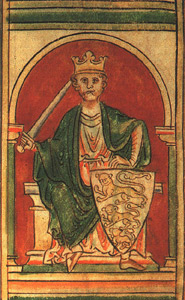Richard I of England
Richard I of England (8 September 1157 – 6 April 1199) was the King of England from 1189 to 1199. He was also Duke of Normandy, Aquitaine and Gascony, Lord of Cyprus, and Count of Poitiers, Anjou, Maine, and Nantes, and was overlord of Brittany at various times. He is sometimes called Richard the Lionheart or Richard coeur de lion which means the same thing in French. Richard was the son of Henry II of England and Eleanor of Aquitaine. As the third son, he was not expected to inherit the throne, and he was a replacement child.[1] At the age of 11, he became Duke of Aquitaine.
| Richard I "the Lionheart" | |
|---|---|
| King of England | |
 | |
| King of England | |
| Reign | 6 July 1189 – 6 April 1199 |
| Coronation | 3 September 1189 |
| Predecessor | Henry II "Curtmantle" |
| Successor | John "Lackland" |
| Regent | Queen Eleanor; William Longchamp, Bishop of Ely (Third Crusade) |
| Born | 8 September 1157 Beaumont Palace, Oxford |
| Died | 6 April 1199 (aged 41) Châlus, Limousin |
| Burial | |
| Spouse | Berengaria of Navarre |
| House | House of Plantagenet |
| Father | Henry II "Curtmantle" |
| Mother | Eleanor of Aquitaine |
| Religion | Catholic Christian |
Later, Richard was one of the leaders of the Third Crusade against Saladin. During his journey, he conquered Sicily and Cyprus. He fought in the Siege of Acre and the Battle of Arsuf. In the end, the crusade did not succeed: Richard was never able to win back Jerusalem from the Muslims. He decided to return home to England.
On his way back from the crusade, Richard was captured by Duke Leopold of Austria. The English people had to pay a huge ransom to set him free. He was considered a brave and noble king, but he spent only six months of his eleven-year reign in England. He died after being shot with a crossbow while besieging a castle in Limousin.
King Richard’s remains were buried in different places.[2] His body was buried at Fontevraud Abbey near Saumur in France,[2] with his father and mother. His internal organs were buried at Châlus, (at The Château de Châlus-Chabrol), near Limoges in central France.[2] His heart was buried in the Notre Dame Cathedral at Rouen.[2]
King Richard’s heart was found in 1838 and was examined by scientists in 2012.[2] They did tests for poisons, because one medieval story claimed Richard had died from a poisoned arrow. They found no evidence to support this idea. Richard probably died from gangrene or septicaemia from the arrow wound.[2]
Richard was succeeded by his younger brother, John.

Legacy
changeBecause of his military exploits his popular image is still dominated by the positive qualities of chivalry and military competence. Contemporaries considered Richard as both a king and a knight famed for personal martial prowess, this was apparently the first instance of such a combination. He was known as a valiant, competent military leader and individual fighter who was courageous and generous. Victorian England admired King Richard I as a crusader and a man of God, erecting a heroic statue of him outside the Westminster Palace.
King Richard I of England was seen as a pious hero by his subjects. He is an enduring iconic figure both in England and in France.
Photo gallery
change-
King Richard I of England
-
Matilda of Scotland (1080 - 1118), Queen of England - great-grandmother of King Richard I of England
-
King Henry II of England - father of King Richard I of England
-
Berengaria of Navarre - wife of King Richard I of England
-
Joan of England, Queen of Sicily - sister of King Richard I of England
-
Ruins of Dürnstein Castle - the first castle where King Richard was kept captive (while on his way back to England)
-
Ochsenfurt, Würzburg, Bavaria, Germany - the second place where King Richard was imprisoned (while on his way back to England)
-
Trifels Castle, Annweiler, Germany - the third place where King Richard was imprisoned (while on his way back to England)
-
Château Gaillard (The Strong Castle), Normandy, France - the most favourite residence of King Richard I of England (build by him in the years 1196 - 1198)
-
Château Gaillard
-
Château Gaillard
-
Château Gaillard
-
Château de Châlus-Chabrol (The Castle of Châlus-Chabrol), Châlus, Haute-Vienne, France - the place where King Richard I of England was mortally wounded on 25.03.1199 and subsequently died of that injury on 06.04.1199
-
Royal Arms of England (1189 - 1198)
-
Richard Coeur de Lion outside the Palace of Westminster, in London
King Richard I of England in the world culture
changeIn 1851 German poet Heinrich Heine wrote the "König Richard" poem which was dedicated to King Richard I of England and was later translated into several languages.
|
|
|
References
change- ↑ Adam Taylor (8 September 2014). "'A spare to the heir': The weirdness of being a royal sibling". The Washington Pose. Retrieved 19 October 2014.
- ↑ 2.0 2.1 2.2 2.3 2.4 2.5 Morelle, Rebecca (28 February 2013). "Richard the Lionheart's mummified heart analysed". bbc.co.uk. Retrieved 1 March 2013.
- ↑ Heinrich Heine's Sämmtliche Werke. Bibliothek-Ausgabe (The Complete Poetic Works of Heinrich Heine. Library Edition), Hamburg: Hoffman und Campe, 1885, p. 45.